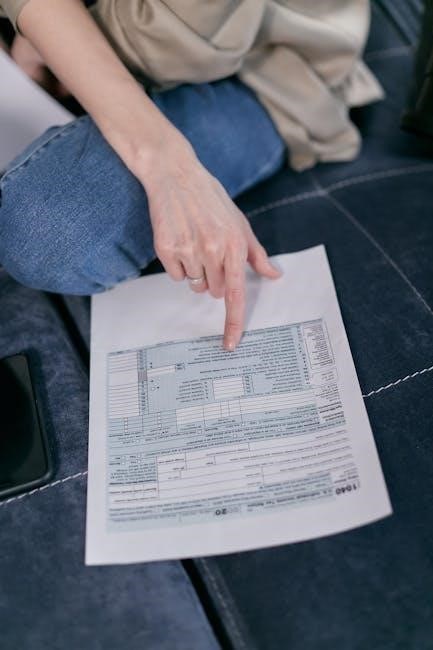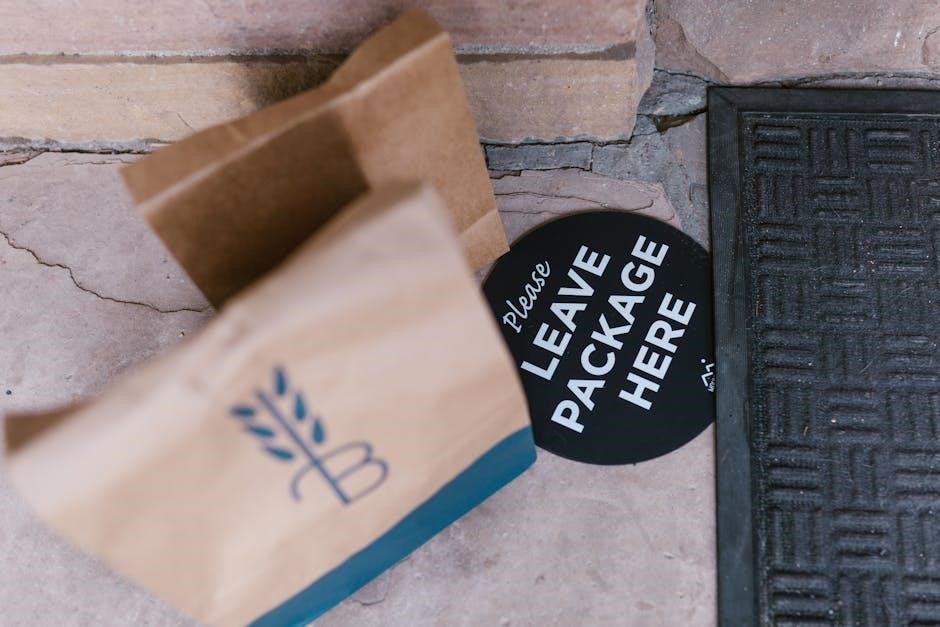nj-cbt-1065 instructions

The NJ-CBT-1065 is a key form for partnerships to report income and calculate taxes for nonresident partners, ensuring compliance with New Jersey’s specific tax regulations and obligations.
Overview of the NJ-CBT-1065 Form
The NJ-CBT-1065 form is the official document used by partnerships to report income, deductions, and tax allocations for nonresident partners in New Jersey. It is specifically designed for partnerships with income derived from New Jersey sources, ensuring compliance with state tax regulations. The form requires detailed information about the partnership’s total income, deductions, and credits, as well as the distribution of these amounts among partners. It also calculates the tax owed on behalf of nonresident partners, ensuring accurate reporting and payment. The form includes key sections such as Schedule T, which summarizes tax payments, and payment vouchers for estimated taxes. Partnerships must file this form annually, and it is essential for maintaining compliance with New Jersey’s Corporation Business Tax (CBT) requirements. Proper completion ensures accurate tax reporting and avoids penalties.
Purpose of the Form for Partnerships
The primary purpose of the NJ-CBT-1065 form is to enable partnerships to report and allocate income, deductions, and credits among their partners, particularly focusing on nonresident partners. This form ensures that partnerships accurately calculate and remit taxes owed to the state of New Jersey. It is designed to comply with the Corporation Business Tax (CBT) regulations, ensuring that all income derived from New Jersey sources is properly accounted for. The form also serves to determine the tax liability of nonresident partners, who may not otherwise have a filing requirement in New Jersey. By filing this form, partnerships ensure transparency and adherence to state tax laws, avoiding potential penalties and ensuring fair tax distribution among all partners. It is a crucial document for maintaining tax compliance and integrity for partnerships operating in New Jersey.
Key Components of the Instructions
The instructions for NJ-CBT-1065 outline essential steps for accurate tax reporting, focusing on calculating the Total Tax Paid on Behalf of Partnership and submitting Schedule T. They detail how to allocate income among partners, particularly nonresidents, ensuring compliance with New Jersey tax laws. The guide emphasizes proper completion of all form sections, including income reporting, deductions, and credits. It also covers deadlines, payment options, and extensions, such as the five-month filing extension if certain payment conditions are met. Additionally, the instructions clarify the role of Schedule T in reporting partner-specific details and ensure accurate tax calculations. By following these components, partnerships can ensure timely and correct filing, avoiding penalties and maintaining compliance with state tax regulations. These instructions are vital for understanding the form’s requirements and ensuring accurate submissions.

Filing Requirements for NJ-CBT-1065
Partnerships with New Jersey-sourced income must file NJ-CBT-1065 to report taxable income and meet state tax obligations, with extensions available via federal Form 7004 and e-filing required.
Who Needs to File the Form
All partnerships, including limited liability companies (LLCs) classified as partnerships for federal tax purposes, with income derived from New Jersey sources must file Form NJ-CBT-1065. This includes entities with both resident and nonresident partners. The form is specifically required for calculating taxes on behalf of nonresident partners, ensuring compliance with New Jersey tax laws. Partnerships must submit the form annually, regardless of whether all partners are New Jersey residents. Failure to file may result in penalties and interest on unpaid taxes. The form is distinct from the NJ-1065, which is used for Gross Income Tax (GIT) reporting. Proper filing ensures accurate tax calculations and adherence to state-specific regulations.
Income Thresholds and Eligibility
All partnerships with income derived from New Jersey sources are required to file Form NJ-CBT-1065, regardless of the income amount. There are no specific income thresholds for eligibility; the requirement is based on the source of income rather than the amount. Partnerships must report all taxable income allocated to New Jersey, even if the income is distributed to nonresident partners. The form is specifically designed to calculate taxes on behalf of nonresident partners, ensuring compliance with state tax laws. Eligibility for filing is determined by the presence of New Jersey-sourced income, not by the partnership’s overall income level. This ensures that all entities with business activities or income in New Jersey are accounted for in the state’s tax system.
Residency Requirements for Partners
Partnerships filing the NJ-CBT-1065 must consider the residency status of their partners, as it impacts tax calculations. Nonresident partners are subject to New Jersey taxes on their share of income derived from the state. The form requires partnerships to allocate income and deductions specifically for nonresident partners, ensuring accurate tax reporting. Resident partners, however, are not subject to the same calculations, as their tax obligations are handled through personal income tax filings. The instructions emphasize that partnerships must accurately report each partner’s residency status to determine the correct tax liabilities. Failure to comply with these requirements may result in penalties or additional scrutiny from the New Jersey Department of Revenue. Proper documentation and accurate reporting are essential to meet the residency-related obligations outlined in the NJ-CBT-1065 instructions.

Understanding the Filing Process
The NJ-CBT-1065 filing process involves gathering necessary documents, calculating taxes for nonresident partners, ensuring compliance with New Jersey’s specific regulations, and accurate submission to avoid penalties and ensure proper reporting.
Step-by-Step Guide to Completing the Form
To complete the NJ-CBT-1065, begin by gathering all necessary documents, including federal Form 1065 and Schedule K-1. Calculate the partnership’s total income and deductions, ensuring accuracy for both resident and nonresident partners.
Next, determine the tax liability for nonresident partners, as this form specifically addresses their tax obligations. Fill in the appropriate fields, ensuring compliance with New Jersey’s tax regulations.
Submit Schedule T to calculate the Total Tax Paid on Behalf of Partnership, which will populate on Line 7 of the NJ-CBT-1065. Review all entries for errors and attach required schedules.
Finally, submit the form electronically or by mail, ensuring timely filing to avoid penalties. Always refer to official instructions for specific guidance and updates.
Required Schedules and Attachments
When filing the NJ-CBT-1065, several schedules and attachments are mandatory to ensure compliance. Schedule T must be submitted to calculate the Total Tax Paid on Behalf of Partnership, which directly updates Line 7 of the form. Additionally, partnerships must include a payment voucher (NJ-CBT-V) if making a payment.
Form CBT-206 is required for extensions of time to file, ensuring at least 90% of the total tax is paid. Attach all relevant federal schedules, including Schedule K-1, to provide detailed partner information.
Ensure all documents are accurately completed and submitted either electronically or by mail to avoid delays or penalties. Always verify the latest requirements to ensure compliance with New Jersey tax regulations.
Calculating Total Tax Paid on Behalf of Partnership
Calculating the Total Tax Paid on Behalf of Partnership is a critical step in completing the NJ-CBT-1065. This calculation is performed using Schedule T, which must be submitted along with the return. Schedule T computes the tax liability for nonresident partners, ensuring compliance with New Jersey tax laws.
The total tax is derived from the income allocated to nonresident partners and is reported on Line 7 of the NJ-CBT-1065. Ensure all partner-specific details are accurately entered to avoid errors.
Partnerships with only New Jersey resident partners are not required to calculate this tax. Always verify calculations and refer to official guidelines for the most accurate and up-to-date instructions.

Special Considerations
Special considerations include extensions of time to file, estimated tax payments for tiered partnerships, and nonresident partner tax calculations, ensuring compliance with specific New Jersey tax regulations.
Nonresident Partner Tax Calculations
The NJ-CBT-1065 form is specifically designed to calculate and report taxes for nonresident partners, ensuring they meet New Jersey tax obligations. Partnerships must provide detailed information about each nonresident partner’s share of income, deductions, and credits. The form also requires documentation of taxes withheld on behalf of nonresident partners. Tax credits are available for payments made by tiered partnerships. Partnerships must file this form even if all partners are New Jersey residents. The deadline for filing is April 15th, with extensions available under certain conditions. Nonresident partners do not need to file individual New Jersey returns if the partnership accurately reports and pays taxes on their behalf. This ensures compliance with state tax laws and avoids double taxation. Proper documentation and accurate calculations are essential to avoid penalties. Consult official guidelines for specific instructions on nonresident partner tax reporting.
Extensions of Time to File
A five-month extension for filing the NJ-CBT-1065 form may be granted if at least 90% of the total tax reported is paid. This payment can come from tiered partnerships, estimated payments, or other payments. To request an extension, partnerships must submit the federal Form 7004 by the original due date. Additionally, Form CBT-206 must accompany the payment if there is tax due. The extension allows partnerships to delay filing but does not extend the deadline for paying taxes. Interest and penalties may apply if payments are insufficient or late. Partnerships must ensure all required forms and payments are submitted timely to avoid compliance issues. This provision helps manage filing complexities while maintaining payment obligations. Consult the official instructions for detailed guidance on extension requirements and procedures. Proper documentation is essential to ensure eligibility for the extension period.
Estimated Tax Payments and Tiered Partnerships
Estimated tax payments are crucial for partnerships, especially tiered ones, to ensure timely compliance with New Jersey tax obligations. Tiered partnerships must make estimated payments to avoid penalties, with payments credited against the total tax liability. A five-month extension for filing NJ-CBT-1065 may be granted if at least 90% of the total tax is paid via estimated payments or tiered partnership payments; Form CBT-206 is required for extensions when tax is due, accompanying the payment. Paid preparers must e-file returns, ensuring adherence to electronic submission mandates. Proper planning and accurate payments are vital to maintain compliance and avoid interest or penalties. Consulting official guidelines is recommended for detailed instructions on estimated payments and tiered partnership obligations. Ensure all payments align with New Jersey tax regulations to prevent any filing discrepancies. Timely and precise payments are essential for seamless tax compliance.

Electronic Filing and Submission
Electronic filing is mandatory for paid preparers, with a 10-day grace period for corrections. Ensure timely submission of Schedule T and retain the confirmation number for records. Accurate filing is essential for compliance.
Electronic Filing Requirements
Electronic filing for NJ-CBT-1065 is mandatory for paid preparers, ensuring accuracy and efficiency. A 10-day grace period is allowed for corrections. Partnerships must submit Schedule T electronically, and upon filing, a confirmation number is provided for records. Extensions of time to file require Form CBT-206, with at least 90% of the total tax paid via tiered partnerships, estimated payments, or other methods. Accurate electronic submission ensures compliance with New Jersey’s tax regulations. Retain the confirmation number for audit purposes. Failure to meet electronic filing requirements may result in penalties. Ensure all data matches the federal return and adheres to state-specific guidelines. Proper electronic filing avoids delays and ensures timely processing of the partnership return.
Submission of Schedule T and Return
Submission of Schedule T and the NJ-CBT-1065 return is essential for accurate tax reporting. Schedule T calculates the Total Tax Paid on Behalf of Partnership, ensuring compliance with New Jersey tax laws. It must be submitted electronically along with the return, especially when nonresident partners are involved. Upon submission, a confirmation number is provided, which should be retained for record-keeping purposes. Failure to submit Schedule T or incorrect filings may result in penalties or processing delays. Ensure all data aligns with federal and state requirements. Proper submission ensures timely processing and avoids issues with the New Jersey Department of Revenue. Always verify that Schedule T is completed accurately before final submission to avoid errors. This step is critical for partnerships to meet their tax obligations effectively.
Confirmation and Record-Keeping
Upon submitting the NJ-CBT-1065 return, a confirmation number will be provided. This number serves as proof of successful filing and must be retained for records. Proper record-keeping is essential for audits and ensuring compliance with state tax regulations. Maintain copies of the filed return, Schedule T, and all supporting documents for at least three years. Failure to keep accurate records may result in penalties or delays in resolving discrepancies. The confirmation number should be stored securely, as it may be required for future reference or amendments. Record-keeping also ensures that partnerships can demonstrate compliance with New Jersey tax laws and provide necessary documentation if requested by the Department of Revenue. Accurate and organized records are vital for avoiding potential issues and ensuring a smooth filing process. Always verify that all records are complete and accessible. This step is crucial for maintaining compliance and avoiding penalties.

Amended Returns and Corrections
File an amended return to correct errors on NJ-CBT-1065 by submitting a revised form with updated information and necessary schedules to avoid penalties and ensure compliance with state tax requirements.
How to File an Amended Return
To file an amended return for NJ-CBT-1065, submit a revised form with corrected information and any necessary schedules. Ensure the form reflects the most recent data and calculations. File the amended return electronically or by mail, following the instructions provided by the New Jersey Division of Taxation. If the original return was filed electronically, the amended return must also be e-filed. Attach supporting documents, such as corrected schedules or explanations of changes, to clarify the amendments. Include payment for any additional tax due or request a refund if overpaid. Submit the amended return to the address listed in the official instructions. Keep a copy of the amended return and supporting documents for your records. This process ensures compliance and resolves any discrepancies in the original filing. Properly filing an amended return helps avoid penalties and ensures accurate tax reporting.
Correcting Errors on the NJ-CBT-1065

If errors are discovered after filing the NJ-CBT-1065, correct them promptly to avoid penalties. Review the form for accuracy, ensuring all income, deductions, and allocations are properly reported. Recalculate totals and verify partner information, especially for nonresidents. Use Schedule T to recalculate the Total Tax Paid on Behalf of Partnership, if applicable. Submit a corrected return with updated schedules and explanations for changes. Include a payment voucher (CBT-206) if additional tax is owed. File the corrected return electronically or by mail, following the same instructions as the original filing. Keep a copy of the corrected return and supporting documents for your records. Timely corrections ensure compliance and prevent potential issues with the New Jersey Division of Taxation. Always refer to official guidelines for specific correction procedures.

Additional Resources and Guidance
Consult official instructions, contact the New Jersey Department of Revenue, or access forms and guidelines for detailed guidance on filing and compliance with NJ-CBT-1065 requirements.
Consulting Official Instructions and Guidelines
Consulting the official instructions and guidelines for NJ-CBT-1065 is essential for accurate and compliant filing. The New Jersey Department of Revenue provides detailed resources, including form instructions, worksheets, and FAQs, to guide partnerships through the filing process. These resources clarify eligibility, income thresholds, and residency requirements, ensuring proper tax calculations for nonresident partners. Additionally, the instructions outline procedures for extensions, estimated payments, and amended returns, helping filers navigate complex scenarios. By referencing these official materials, partnerships can avoid errors and ensure adherence to state tax regulations. Always check the latest updates from the Division of Taxation for the most current information and guidance.
Contacting the New Jersey Department of Revenue
For assistance with NJ-CBT-1065, the New Jersey Department of Revenue provides multiple avenues for support. Taxpayers can contact the Division of Taxation directly via phone or email for clarifications on filing requirements, tax calculations, or resolving issues. The department also offers an online portal for submitting inquiries and accessing resources. Additionally, partnerships can visit local office locations during business hours for in-person assistance. The Division of Taxation website contains a wealth of information, including forms, instructions, and FAQs, to help filers navigate the process. For complex cases, such as nonresident partner tax calculations or extension requests, reaching out to the department ensures accurate and compliant filing. Prompt communication with the New Jersey Department of Revenue can address concerns and prevent potential delays or penalties.
Leave a Reply
You must be logged in to post a comment.